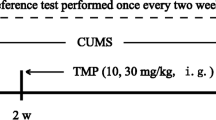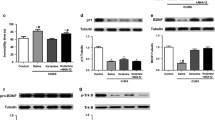Abstract
Objective
To explore the effect of nootkatone (NKT) on chronic unpredictable mild stress (CUMS)-induced depressive-like behaviors and the mechanism underlying NKT improving the depressive-like behaviors.
Methods
The CUMS-induced depression model was established in mice. Fifty mice were randomized into 5 groups (n=10) in accordance with a random number table: control group, CUMS group, CUMS + NKT (6 mg/kg) group, CUMS + NKT (12 mg/kg) group, and CUMS + ketamine group. From the 22th day, NKT (6 or 12 mg/kg) or ketamine (0.5 mg/kg) was given with intragastric administration every day for 21 days. Behavioral tests including forced swimming test (FST), tail suspension test (TST), sucrose preference test (SPT) and open-field test (OFT) were carried out. The mRNA and protein expressions of interleukin (IL)-1β, IL-18, IL-6, and tumor necrosis factor (TNF)-α in hippocampus were assessed using quantitative realtime polymerase chain reaction (PCR), Western blot analysis, and enzyme linked immunosorbent assay. The nuclear factor-κB (NF-κB)/NOD-like receptor 3 (NLRP3) inflammasome pathway was analyzed using Western blot and immunofluorescence analysis.
Results
NKT treatment improved CUMS-induced depressive-like behaviors in mice (P<0.05 or P<0.01). NKT significantly decreased the mRNA and protein levels of IL-1β, IL-18, IL-6, and TNF-α in hippocampus of CUMS mice (P<0.05 or P<0.01). Furthermore, NKT repressed CUMS-induced activation of NF-κB signaling and NLRP3 inflammasome (P<0.01). More important, Nigericin, a NLRP3 activator, destroyed the effect of NKT on repressing neuroinflammation and improving depressive-like behaviors (P<0.05 or P<0.01).
Conclusion
NKT ameliorates the depressive-like symptoms, in part by repressing NF-κB/NLRP3-mediated neuroinflammation.
Similar content being viewed by others
References
Smith K. Mental health: a world of depression. Nature 2014;515:181.
Cui R. Editorial: a systematic review of depression. Curr Neuropharmacol 2015;13:480.
DeFilippis M, Wagner KD. Management of treatment-resistant depression in children and adolescents. Paediatr Drugs 2014;16:3533–3561.
Cosci F, Mansueto G, Fava GA. Relapse prevention in recurrent major depressive disorder: a comparison of different treatment options based on clinical experience and a critical review of the literature. Int J Psychiatry Clin Pract 2020;24:1–8.
Li J, Lu C, Gao Z, Feng Y, Luo H, Lu T, et al. SNRIs achieve faster antidepressant effects than SSRIs by elevating the concentrations of dopamine in the forebrain. Neuropharmacology 2020;177:108237.
Perez-Esparza R. Ketamine for treatment-resistant depression: a new advocate. Rev Invest Clin 2018;70:65–67.
Zhang H, Sun Y, Qian S, Ge R, Guo X, Shen Q, et al. Yueju-Ganmaidazao Decoction confers rapid antidepressant-like effects and the involvement of suppression of NMDA/NO/cGMP signaling. J Ethnopharmacol 2020;250:112380.
Ren L, Chen G. Rapid antidepressant effects of Yueju: a new look at the function and mechanism of an old herbal medicine. J Ethnopharmacol 2017;203:226–232.
Wei XH, Cheng XM, Shen JS, Wang ZT. Antidepressant effect of Yueju-Wan ethanol extract and its fractions in mice models of despair. J Ethnopharmacol 2008;117:339–344.
Wu R, Zhu D, Xia Y, Wang H, Tao W, Xue W, et al. A role of Yueju in fast-onset antidepressant action on major depressive disorder and serum BDNF expression: a randomly doubleblind, fluoxetine-adjunct, placebo-controlled, pilot clinical study. Neuropsychiatr Dis Treat 2015;11:2013–2021.
Choi JE, Park DM, Chun E, Choi JJ, Seo JH, Kim S, et al. Control of stress-induced depressive disorders by So-ochim-tang-gamibang, a Korean herbal medicine. J Ethnopharmacol 2017;196:141–150.
Zhou ZL, Lin SQ, Yin WQ. New cycloartane glycosides from the rhizomes of Cyperus rotundus and their antidepressant activity. J Asian Nat Prod Res 2016;18:662–668.
Xia B, Tong Y, Xia C, Chen C, Shan X. Alpha-Cyperone confers antidepressant-like effects in mice via neuroplasticity enhancement by SIRT3/ROS mediated NLRP3 inflammasome deactivation. Front Pharmacol 2020;11:577062.
Yan T, Li F, Xiong W, Wu B, Xiao F, He B, et al. Nootkatone improves anxiety- and depression-like behavior by targeting hyperammonemia-induced oxidative stress in D-galactosamine model of liver injury. Environ Toxicol 2020;36:694–706.
Guo Y, Gan X, Zhou H, Zhou H, Pu S, Long X, et al. Fingolimod suppressed the chronic unpredictable mild stress-induced depressive-like behaviors via affecting microglial and NLRP3 inflammasome activation. Life Sci 2020;263:118582.
Monteiro S, Roque S, de Sa-Calcada D, Sousa N, Correia-Neves M, Cerqueira JJ. An efficient chronic unpredictable stress protocol to induce stress-related responses in C57BL/6 mice. Front Psychiatry 2015;6:6.
Du RW, Bu WG. Metformin improves depressive-like symptoms in mice via inhibition of peripheral and central NF-kappaB-NLRP3 inflammation activation. Exp Brain Res 2020;238:2549–2556.
Zhang SS, Zong Y, Ren ZG, Hu JT1, Wu XY, Xiao HL, et al. Regulation of indoleamine 2, 3-dioxygenase in hippocampal microglia by NLRP3 inflammasome in lipopolysaccharide-induced depressive-like behaviors. Eur J Neurosci 2020;52:4586–4601.
Deng XY, Xue JS, Li HY, Ma ZQ, Fu Q, Qu R, et al. Geraniol produces antidepressant-like effects in a chronic unpredictable mild stress mice model. Physiol Behav 2015;152:264–271.
Lockwood LE, Su S, Youssef NA. The role of epigenetics in depression and suicide: a platform for gene-environment interactions. Psychiatry Res 2015;228:235–242.
Willner P. Animal models of depression: an overview. Pharmacol Ther 1990;45:425–455.
Author information
Authors and Affiliations
Contributions
Zhao XH, AN na, Xia MH, Liu WP, Bao JZ and Wang QQ conceived and designed the experiments, performed the experiments, analyzed the data, prepared the figures and/or tables and drafted the work or revised it critically for important content.
Corresponding author
Ethics declarations
The authors declare that they have no competing interests.
Additional information
Data Accessibility
All data in our study are available in this manuscript.
Supported by the Future Plan of Shanghai Municipal Hospital of Traditional Chinese Medicine (2021) Inheritance Talent Project (No. WLJH2021ZY-MZY033), The Xinglin Inherit-patterned Talents Program of Shanghai University of Traditional Chinese Medicine, Shanghai University of Traditional Chinese Medicine (No. 10 (2019) of the Personnel Office of Shanghai University of TCM) “The Fourth Batch of Clinical Young and Middle-Aged Backbone Teachers’ Teaching Ability Improvement Plan”
Rights and permissions
About this article
Cite this article
Zhao, Xh., An, N., Xia, Mh. et al. Nootkatone Improves Chronic Unpredictable Mild Stress-Induced Depressive-Like Behaviors by Repressing NF-κB/NLRP3-Mediated Neuroinflammation. Chin. J. Integr. Med. 29, 37–43 (2023). https://doi.org/10.1007/s11655-022-3725-2
Accepted:
Published:
Issue Date:
DOI: https://doi.org/10.1007/s11655-022-3725-2




